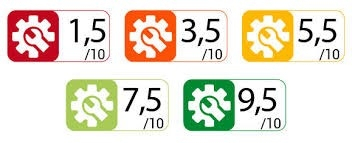While many measures of Law No. 2020-105 of 10 February 2020 on anti-wastage and the circular economy (AGEC Law) were immediately applicable, the entry into force of some were subject to the publication of a decree or deferred to allow a reasonable transition to economic actors (on the philosophy and contributions of the law, see all our articles).
In the field of consumer information, several implementing texts have been published in the last three years. They detail the legislative measures adopted to provide consumers with better information (to find out more, please refer to our article "New consumer information obligations - The anti-wastage & circular economy law organises greater transparency to the benefit of consumers").
Implementing legislation on information regarding environmental qualities and characteristics
Decree No. 2022-748 of 29 April 2022 on the provision of information to consumers on the environmental qualities and characteristics of products generating waste
This decree implements Article 13 of the AGEC Law and makes it mandatory to inform consumers about the environmental qualities and characteristics of the waste-generating products they purchase.
Since 1 January 2023, in accordance with a schedule provided for by the decree, producers, importers and any other person who meets certain criteria must make available to the consumer, depending on the categories of products concerned, a set of information relating to their incorporation of recycled material, their recyclability, the presence of dangerous substances, precious metals or rare earths, their compostability, their re-usability, geographical traceability, or the presence of plastic microfibers.
This information must be provided for each product model concerned by means of a single product sheet entitled ‘product sheet on environmental qualities and characteristics’ (‘fiche produit relative aux qualités et caractéristiques environnementales’), made available online and easily accessible free of charge at the time of the purchase.
For example:
- For products subject to EPR in the textile sector, the decree requires consumers to be informed about the traceability of products, mentioning the country where each of the following operations is mainly carried out, when they exist:
- Weaving;
- Dyeing and printing; and
- Manufacturing
Please note: The compliance with EU law of this obligation to provide information on the geographical origin of textile products not provided for by the AGEC law is open to question.
- Consumer information on the presence of a hazardous substance is mandatory if it is present in concentrations exceeding 0.1% by mass percentage in a substance, mixture or article (as defined in the REACH Regulation). Pursuant to Decree No. 2021-1285 of 1 October 2021, these dangerous substances are:
- substances of very high concern (SVHC) included in the list referred to in Article 59(1) of REACH;
- substances of comparable concern to SVHCs. The list of these substances is set by decree (currently being drafted).
Decree No. 2021-1110 of 23 August 2021 on making available information to identify endocrine disrupters in a product
This decree lays down the procedures for making available the information enabling the identification of endocrine disrupters which are known, presumed or suspected in a product placed on the market.
In particular, it provides that any person who places on the market products containing substances which, according to ANSES (French Agency for Food, Environmental and Occupational Health Safety), have endocrine disrupting properties, shall publish a list of such products and of the substances contained in each of them.
This information shall be made available in a dematerialised format, accessible free of charge and reusable in order to allow aggregation. If the product concerned is also the subject of an obligation to inform consumers in respect of environmental qualities and characteristics, this information shall be made available on the same media as those provided for above (dematerialized form).
Texts implementing the repairability index
Decree No. 2020-1757 and decree of 29 December 2020
The first implementing texts of the Electrical and Electronic Equipment (EEE) Repairability Index provided for in Article L.541-9-2 of the French Environmental Code, which entered into force on 1 January 2021, were published on 31 December 2020.
Two of them are of general application to all EEE: Decree No. 2020-1757 and the Decree of 29 December 2020 prescribing the general methodology for the calculation and the format of the EEE reparability index. They establish the following framework:
- Principle of the establishment of the repairability index by the producer/importer for each model of EEE. The producer/importer must communicate this index and the details of the parameters that allowed it to be established to the distributor/retailer at the time of referencing or delivery of the EEE;
- mandatory format and methodology for establishing the repairability index (graphical representation, font, colour code) and for parameters (restricted tabular format);
- the possibility to affix the repairability index directly to the EEE or to the packaging by means of a label/marking, provided that the mandatory format is respected;
- an obligation for the seller to bring the repairability index to the attention of consumers when purchasing new equipment in stores (visible on EEE or in the immediate vicinity) or when selling remotely (visible in EEE presentation and close to price);
- obligation for the seller to make available to consumers, by any appropriate means, the parameters which contributed to the calculation of the repairability index (as communicated by the producer/importer);
- making this information available to the public (repairability index + parameters) by the producer/importer by electronic means and providing it free of charge to any person who so requests within 15 days.
These implementing texts were supplemented by two sets of orders of 29 December 2020 and 22 April 2022 detailing the criteria to be used to establish the reparability index of specific categories of EEE: (i) laptops, (ii) smartphones, (iii) front-loading washing machines, (iv) televisions, (v) lawnmowers, (vi) top-loading washing machines, (vii) dishwashers, (viii) vacuum cleaners and (ix) high-pressure cleaners.
While the obligation to establish the reparability index and make it available to the consumer has in principle been applicable since January 2021 for the first five categories of EEE referred to above, public authorities did not actually start carrying out their checks until January 2022 in order to give operators time to comply. The obligation entered into force in early November 2022 for the remaining four EEE categories.
Texts implementing consumer information on sorting rules
Order of 30 November 2020 on signs and markings which may cause confusion as to the rules for sorting or delivering waste from the product – annulled by the French Council of State on 30 June 2023
This order was made for the application of article L.541-10-3 of the French Environmental Code which provides for the penalisation of the use of signs and markings that can lead to confusion on the rule for sorting or delivering the waste from the product. This penalisation consists in applying a penalty to the eco-contribution paid for waste management, leading to a doubling of its amount.
The order specifieds that the signs and markings in question are those representing two or more rotating arrows in a circle, with the exception of:
- Triman logo;
- signages regulated by another EU Member State, provided they inform consumers that the product is recyclable or subject to a sorting rule;
- logos associated with the brand under which a product is sold or distributed or associated with the company that sells or distributes the product.
Please note: In a decision dated 30 June 2023, the French Council of State annulled the order of 30 November 2020, as well as 4° of II of the appendix to the order of 25 December 2020 (suspended in summary proceedings since 15 March 2021), which subsequently modified the specifications of the eco-organizations to include the doubling of the contribution due, in the event of use of the Green Dot (CE, 30 June 2023, no. 449872, 450134, 450158).
The order was not annulled on the grounds that it might undermine free competition within the Union, but on the grounds that it had not been notified, prior to its publication, to the European Commission, as any rule of a technical nature must be, within the meaning of Directive (EU) 2015/1535 of 9 September 2015.
Decree No. 2021-835 of 29 June 2021 on informing consumers on the rules for sorting waste from products subject to the extended producer responsibility principle
This text specifies the procedures for implementing the signs informing the consumer that the product is subject to a sorting rule (Triman logo) and to an information specifying the procedures for sorting or delivering the waste from the product (the “Info-Tri”).
Since 1 January 2022, the Triman logo (or the “crossed out bin” for EEE and batteries) and information on the procedures for sorting or dropping off waste from the product, known as “Info-Tri”, must be systematically affixed to the packaging of products intended for households and covered by an EPR scheme (except small packages).
The Info-Tri is set up for each product category by the eco-organisations of the EPR scheme. It shall apply in a differentiated manner to each component of the product or waste derived therefrom, if they are subject to different sorting procedures.
A transitional arrangement has been provided for: the Triman logo must in practice be affixed to the packaging of products within 12 months of the date of approval of the accompanying Info-Tri. An additional period of 6 months is provided for the disposal of stocks.
Each EPR scheme has its own timetable:
- For EEE, a transition period was granted until 15 June 2023 for products manufactured before 15 December 2022.
- For household packaging, a transition period was initially granted until 9 March 2023 (then postponed to 15 June 2023 to be aligned on EEE) for products manufactured before 9 September 2022.
Please note: On 15 February 2023, the European Commission opened infringement proceedings against France for non-compliance of its labelling requirements regarding waste sorting instructions with the principle of free movement of goods (Triman logo and Info-Tri signages). To be continued...
In a parallel proceeding, on 21 April 2023, the French Council of State rejected the appeals on the grounds of ultra vires filed against "Triman" decree no. 2021-835 of 29 June 2021 by trade organizations, which claimed in particular that the principle of the free movement of goods had been disregarded. On this point, the Council of State ruled that the new “Triman” regulation constitutes a measure equivalent in effect to a quantitative restriction on imports, but that it is justified by the objective of protecting the environment and cannot be considered as going beyond strictly necessary constraints. This decision does not prejudge the Commission's future decision.
Implementing legislation on spare parts
Minimum period of availability for certain goods
This Decree specifies the list of categories of equipment (laptops and multifunction mobile phones) and spare parts to be made available on the market for a minimum period of five years from the date of placing on the market of the last unit of the equipment model concerned.
This Decree specifies the list of categories of medical devices and spare parts to be made available on the market for a minimum period of five years from the date of placing on the market of the last unit of the equipment model concerned.
Use of spare parts from the circular economy
The Decree specifies the categories of household or electronic equipment (household washing and washing machines and dryers; household dishwashers; refrigerators; televisions and monitors; laptops; mobile and multifunction telephones) and spare parts that are subject to the obligation to offer circular economy parts in the context of the marketing of maintenance and repair services. It also defines circular economy parts as components and elements resulting from a preparation operation for their reuse.
- Decree no. 2021-1945 of 31 December 2021 on consumer information on the conditions of sale of parts from the circular economy as part of maintenance or repair services for household electrical equipment, small IT and telecommunications equipment, screens and monitors
This decree specifies how consumers are to be informed about the conditions under which the professional must provide consumers with at least one offer that includes parts from the circular economy instead of new parts, when repairing or servicing household appliances, small IT and telecommunications equipment, screens and monitors.
- Decree no. 2022-59 of 25 January 2022 on consumer information on the conditions of sale of parts from the circular economy as part of maintenance or repair services for certain medical equipment.
The decree specifies how consumers are to be informed about the conditions under which professionals must offer consumers at least one offer that includes parts from the circular economy instead of new parts, when repairing or servicing medical equipment.
Implementing text relating to the conditions of use of the terms ‘refurbished and ‘refurbished product’
This decree determines the conditions of use of the terms “refurbished” and “refurbished product”.
The use of these terms is thus reserved for second-hand products complying with specific conditions regarding the performance of tests, or even one or more technical interventions to ensure the product’s safety and functionality.
Furthermore, in order to avoid the consumer being misled as to the characteristics of a refurbished product, any reference to a new product is prohibited and the use of the term ‘refurbished in France’ is only allowed if the refurbishing operations were carried out in full in France.
These rules also apply to spare parts.
Other implementing legislation on consumer information
- Decree No. 2021-609 of 18 May 2021 on the indication of the existence and duration of the legal guarantee of conformity on the invoicing documents for certain categories of goods
This decree specifies the list of goods for which the “invoicing document” (invoice or sales receipt) provided to consumers must include the existence of the legal guarantee of conformity of two years from their delivery to the consumer. The categories of goods concerned are as follows:
- household appliances;
- IT equipment;
- consumer electronic products;
- telephones;
- cameras;
- appliances with electric or combustion motors for DIY or gardening;
- games and toys (including video game consoles);
- sporting goods;
- watches and watchmaking products;
- lighting and luminaires;
- sunglasses; and furnishings.
However, this requirement does not apply when the purchase is made under a contract concluded off-premises or remotely (although such an indication will have to appear in the contract confirmation provided on a durable medium).








%20(3)%20(1).jpg?v=2)





Social Media cookies collect information about you sharing information from our website via social media tools, or analytics to understand your browsing between social media tools or our Social Media campaigns and our own websites. We do this to optimise the mix of channels to provide you with our content. Details concerning the tools in use are in our privacy policy.